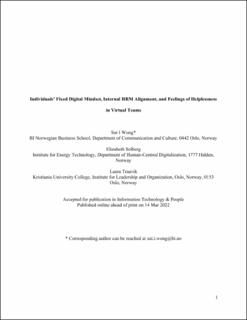| dc.contributor.author | Wong, Sut I | |
| dc.contributor.author | Solberg, Elizabeth | |
| dc.contributor.author | Traavik, Laura E. Mercer | |
| dc.date.accessioned | 2022-10-25T09:59:55Z | |
| dc.date.available | 2022-10-25T09:59:55Z | |
| dc.date.created | 2022-03-14T07:26:40Z | |
| dc.date.issued | 2022 | |
| dc.identifier.citation | Information Technology and People. 2022, . | en_US |
| dc.identifier.issn | 0959-3845 | |
| dc.identifier.uri | https://hdl.handle.net/11250/3028145 | |
| dc.description.abstract | Purpose The present study investigates whether individuals having a fixed digital mindset (comprises fundamental beliefs about technological ability and organizational resources as work becomes more digitalized) experience greater helplessness working in virtual teamwork environments. The authors examine how perceived internal human resource management (HRM) alignment moderates the positive relationship expected between individuals' fixed digital mindset and feelings of helplessness. Together, the paper aims to contribute to a greater understanding of the personal and contextual factors that influence an individual's experience of helplessness in virtual team settings. Design/methodology/approach The authors test the hypotheses using time-lagged survey data collected from 153 information technology (IT) engineers working in virtual teams in Europe. Findings The authors find that individuals with higher levels of fixed digital mindset experience greater helplessness in virtual teamwork environments than individuals with lower levels. Furthermore, the authors find that having higher-fixed beliefs about organizational resources is positively related to helplessness when individuals perceive that the broader HRM system is misaligned with the virtual teamwork environment. Research limitations/implications The data were obtained from IT engineers in Europe, which is potentially limiting the generalizability of the authors' findings to other work contexts and cultures. Practical implications The authors' study helps leaders in virtual teamwork environments to better understand and manage the personal and contextual factors that could affect individuals' well-being and effective functioning in such settings. Originality/value The authors' research contributes to the scant literature investigating the personal characteristics important in virtual teamwork environments and the contextual factors important for aligning virtual teamwork designs with the organizational system. The authors extend this research by looking at personal and contextual factors together in a single model. | en_US |
| dc.language.iso | eng | en_US |
| dc.rights | Navngivelse-Ikkekommersiell 4.0 Internasjonal | * |
| dc.rights.uri | http://creativecommons.org/licenses/by-nc/4.0/deed.no | * |
| dc.title | Individuals' fixed digital mindset, internal HRM alignment and feelings of helplessness in virtual teams | en_US |
| dc.title.alternative | Individuals' fixed digital mindset, internal HRM alignment and feelings of helplessness in virtual teams | en_US |
| dc.type | Peer reviewed | en_US |
| dc.type | Journal article | en_US |
| dc.description.version | acceptedVersion | en_US |
| dc.rights.holder | © 2022, Emerald Publishing Limited. | en_US |
| dc.source.pagenumber | 21 | en_US |
| dc.source.journal | Information Technology and People | en_US |
| dc.identifier.doi | 10.1108/ITP-04-2021-0310 | |
| dc.identifier.cristin | 2009357 | |
| dc.relation.project | Norges forskningsråd: 275347 | en_US |
| cristin.ispublished | true | |
| cristin.fulltext | postprint | |
| cristin.qualitycode | 1 | |

